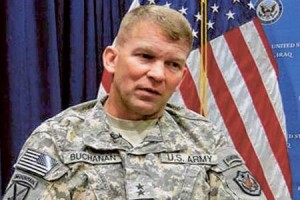Special to WorldTribune.com
BAGHDAD — The U.S. military has assessed that it was leaving a small
but resilient Al Qaida presence in Iraq.
Officials said the U.S. military has assessed that the Al Qaida network
in Iraq has shrunk significantly since 2009. They said the Islamic
insurgency network does not contain more than 1,000 operatives, most of them
located in northern and western Iraq.

“They include everybody from terrorists involved in operations to media to finance to fighters,” U.S. military spokesman in Iraq, Maj. Gen. Jeffrey Buchanan, said.
Officials said at least 200 Al Qaida members were believed to be active in operations, including assassinations and suicide bombings. They said AQI has been recruiting in most of Iraq except for the Shi’ite south and was benefiting from an alliance with former supporters of the late President Saddam Hussein.
The military has assessed that AQI was hampered by a shortage of funds. But they said the network remains highly lethal and capable of simultaneous mass-casualty attacks.
“I cringe whenever anybody makes a pronouncement that Al Qaida is on its
last legs,” Buchanan said.
The U.S. military sought to significantly weaken Al Qaida before the
withdrawal from Iraq in late 2011. But officials said Al Qaida would
continue to present a major threat to the Baghdad government as well as the
Shi’ite and Kurdish communities.
Still, AQI has changed since 2009. Officials said the foreign presence
in the Iraqi network has diminished to as little as 15 percent, with young
Sunnis recruited for operations.
Al Qaida was also said to have lowered its sights from as late as 2008
when the network envisioned rule over a swathe of western and northern Iraq.
Officials said AQI was instead focusing on pressuring the government through
selected attacks that threaten the government and garner support of the
Sunni minority.
AQI has been led by Ibrahim Awad Ibrahim Ali Al Badri, designated by the
United States as a special global terrorist. Washington has posted a $10
million reward for information that leads to his capture of death.
Unlike his predecessors, Al Badri, known as Abu Dua, has taken a low
profile since his appointment in April. The exception was his threat to
conduct 100 operations in Iraq to avenge the U.S. assassination of Osama bin
Laden in May.
In October, the National Counterterrorism Center determined that
AQI was planning operations outside Iraq. NTC director Matthew Olsen cited
the arrest of two suspected AQI operatives in Kentucky in May.
“We assess that AQI remains committed to Al Qaida’s global agenda and
are concerned they may be intent on conducting external operations, to
include in the homeland,” Olsen told the House Intelligence Committee on
Oct. 6.

You must be logged in to post a comment Login